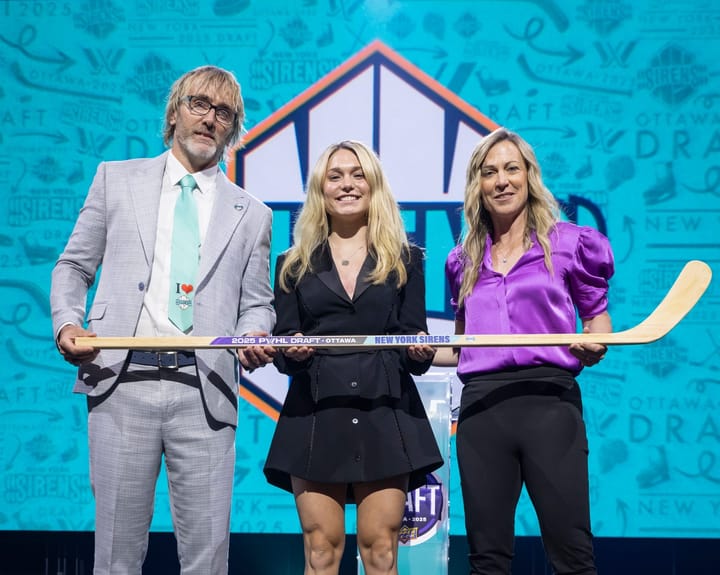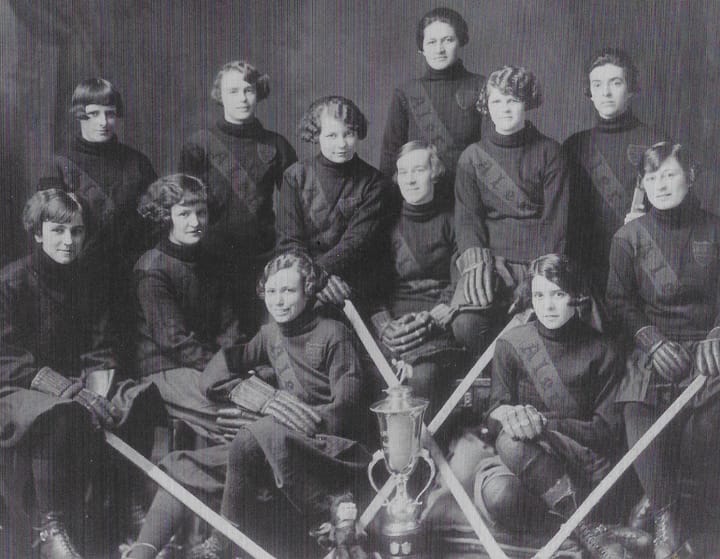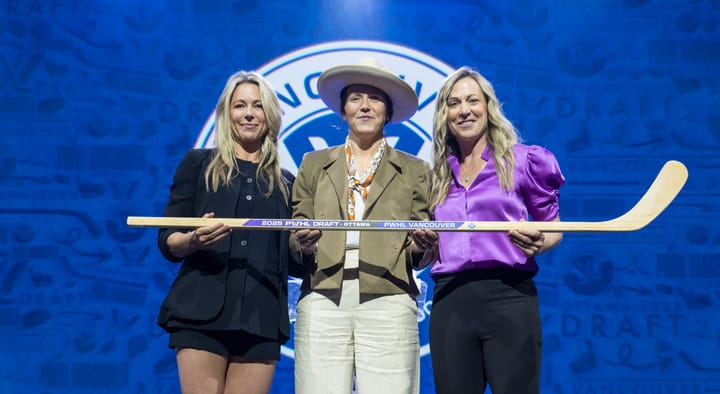Michaela Boyle’s road from recovery to record books
Robert Morris forward Michaela Boyle finding her goal-scoring touch after shoulder surgery
When 2019 began, Michaela Boyle was home in Massachusetts, wondering if she’d find another team to play on. She’d just transferred out of Clarkson University in the middle of her sophomore year, a couple of months after having shoulder reconstructive surgery.
The circumstances for finding a new team weren’t ideal. She’d reached out to several Division I schools, but was turned away again and again. Finally, she told her dad that she didn’t see how she’d make her way back to playing Division I hockey.
“I woke up that morning and I told my dad, ‘Should I just start looking at Division III, or should I reach out to Division II teams?’” she said. “‘I’m really not sure what I’m supposed to do at this point. Nothing seems to be working out.’ And my dad was like, ‘Every time you say something like this, something good comes from it.’ He was like, ‘There’s always something that follows it up.’”
That same day, Robert Morris assistant coach Logan Bittle reached out to Boyle to see if she’d be interested in coming to play for the Colonials.
“I looked at my dad and I was like, ‘I think this is that good thing you were talking about,’” she said.
Now, Boyle will close out 2019 as one of the top goal scorers in NCAA Division I women’s hockey. She’s an integral part of one of the most productive lines in the country. And before completing even one semester at RMU, she’s already put her name in the school record books, multiple times.
Boyle, a former Boston Globe Player of the Year in 2017, started her college career at Clarkson, where she won a national championship as a freshman in 2018. Her sophomore season, however, was cut very short when she injured her shoulder.
She initially suffered that injury in the first series of the year against Bemidji State. She took a few days off the ice to rest it, and said her shoulder felt normal after that, so she dressed for Clarkson’s next game against Robert Morris.
“In warmups, I wound up for a slap shot and took the shot, and just felt a pop in my shoulder and just excruciating pain,” Boyle said.
The injury was season-ending; she underwent reconstructive surgery at the end of October to repair her shoulder. As the semester went on, though, she began to realize her shoulder wasn’t the only thing bothering her. She wasn’t happy in her current situation—a frustrating thing to reckon with after all of the hard work and dedication she’d put into being a Division I hockey player.
“One thing that I noticed was that hockey was turning into the deciding factor of my mood, and [that] how each day was going to turn out was based on what line I was on or how my rehab was going or something like that,” Boyle said. “I realized that, you know, if you can’t create your own happiness for yourself in the situation you’re in, then the only opportunity you have to change that is to change your surroundings and to try again.”
At that point, she made the difficult decision to transfer out of Clarkson after the fall semester. That left her without a team while facing a long road to recovery for her shoulder.
“I think it was obviously a big risk,” Boyle said. “There’s so many unknowns. You’re leaving the only atmosphere you’ve really ever known, a team setting, and you’re stepping away from that at kind of the hardest point of your life and the point where you feel you need your teammates and your coaching staff and people like that the most.”
At the time, Boyle was looking to transfer to a school near Boston so she could be closer to her family. She says she contacted basically every school in Hockey East once entering the transfer portal, but unfortunately, there wasn’t a fit.
She found one at Robert Morris instead. After Bittle reached out, she decided to visit campus.
“It was hard not to fall in love with it,” Boyle said. “One of the things that kind of struck me most is how many girls took the time to come up and introduce themselves to me and say, you know, ‘We’re sorry about what happened. But we hope you choose this place to be your home, because we’d be grateful to have you.’
“I think that’s what struck me most is like, look at these people who don’t even know me, who are already showing that they care.”
Despite some question marks as far as Boyle’s injury, Robert Morris head coach Paul Colontino didn’t see it as a big risk to take a chance on her.
“With the injury, I thought she did a really nice job of just briefing us and getting us up to speed with where she was,” he said. “And we know she’s a very honest person and after kind of hearing where she was at with things and what she was doing, we felt that the risk was very little.”
Boyle has spent her redshirt sophomore season on the Colonials’ first line, notching 13 goals on the year, which ties her for sixth in the country. She’s scored two hat tricks so far, tying Rebecca Vint for a single-season program record, and she has a record of her own: her hat trick against Rensselaer on Nov. 24 was the fastest in program history.
Her linemates, Jaycee Gebhard and Lexi Templeman, are two of the NCAA’s top scorers as well. Gebhard was just named National Player of the Month and ranks fourth nationally in scoring with 35 points. Templeman has 24 points and 19 assists, which puts her sixth nationally.
“Jaycee has this insane ability to just score and produce in clutch moments and Lexi, she’s crafty; she has an eye for for plays that some people don’t see,” Boyle said. “I think that they make it easy for me. They put pucks on my stick and all I have to do is find a way to put it in the back of the net.”
Colontino says Boyle’s own skillset and hockey sense bring an added dimension to his top line, and all three players complement each other.
“[Boyle] reads off of her teammates very, very well,” he said. “She’s just a very mature player. And I think when you combine her smarts with her skillset, she puts herself in the right place on the ice quite often, and with that she gets rewarded with goal-scoring opportunities.”
Robert Morris was faced with one of the toughest schedules to open the season, with series against Clarkson, Cornell, and Minnesota. They put up a strong fight in many of those games but their record still slipped to 2-5-1. Since then, the Colonials have posted a 7-1-1 record and tied a program best with a seven-game win streak.
“I think you kind of appreciate the wins a lot more when you go through a spell like that where you’re not winning,” Boyle said. “I think that’s one [way] that we grew so much as a program because in a time like that, you need to really come together.”
Boyle didn’t start playing hockey until she was nine years old, but she grew up in a very unique athletics environment. Her dad, Mike Boyle, was the strength and conditioning coach for the U.S. women’s Olympic teams in 1998 and in 2014. He’s trained a number of other U.S. women’s national team players over the years, as well as the Boston Red Sox, the Boston Bruins, and Boston University’s men’s hockey team.
Her dad has had a major influence on Boyle’s life, but so did the players he coached. She got a firsthand look at what it took for the women’s national team players to compete at a high level. They helped shape her dedication and commitment to hockey and other areas of her life. She remembers Team USA legend Angela Ruggiero giving her old Team USA apparel every time she’d get an A on her report card.
They also helped her navigate what she could grow up to be, which Boyle acknowledges is very different from what is often visible to other girls.
“I think it gave me that female vision that I can be what I want to be,” she said. “You hear so many girls who are growing up saying they want to play in the NHL, or they want to be the next David Pastrnak, and in all reality, that isn’t a reality. You’re not going to be the next David Pastrnak. And I think I was lucky to grow up with such strong female role models in my life.”
For further reading on Michaela’s story, check out a piece she penned for Women’s Hockey Life - “Overcoming Adversity from Hockey Injuries”.





Comments ()